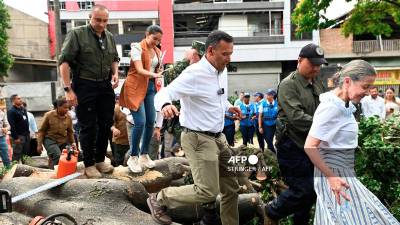CALI: Colombia’s defence minister pledged to defeat desperate armed groups following twin guerrilla attacks that killed nineteen people and intensified the country’s worst security crisis in decades.
Minister Pedro Sanchez convened with top security officials in Cali where a truck bomb exploded on a busy street killing six civilians and wounding sixty on Thursday afternoon.
Authorities confirmed all victims were civilians despite the vehicle-mounted cylinder bombs detonating near a military aviation school.
“All of a sudden, something incredibly powerful exploded and everyone fell to the ground,“ eyewitness Jose Burbano told AFP.
Guerrillas in the northwest region used rifles and drones to down a police helicopter hours earlier, leaving thirteen officers dead.
Sanchez asserted the military was making progress against armed groups on multiple fronts despite these devastating attacks.
“The impact on criminal groups has been to drive them to a state of desperation,“ he said.
Sanchez explained that extortion, murders and child recruitment had decreased in five operational areas, prompting groups to resort to terrorism.
President Gustavo Petro’s leftist government attributed both attacks to guerrilla groups that split from FARC rejecting the 2016 peace accord.
“We are facing an international mafia, with armed gangs here,“ Petro stated around midnight Thursday.
Petro faces increasing scrutiny regarding security shortcomings and his strategy of engaging rather than combating armed groups.
“This is an intelligence failure that has to be corrected,“ Cali mayor Alejandro Eder revealed to local radio Friday, disclosing a second truck bomb had failed to detonate.
“If both had exploded, the situation would have been infinitely worse,“ he said.
Police confirmed apprehending one suspected attacker named Sebastian, identified as a member of the Central General Staff dissident guerrilla group.
Colombia’s 2016 peace deal brought relative tranquility following decades of armed conflict that killed hundreds of thousands of people.
The agreement spawned numerous dissident guerrilla groups, paramilitaries and cartels continuing to compete for territory and cocaine trade control.
Guerrillas face blame for dozens of recent attacks, including a conservative presidential candidate assassination, raising concerns about returning violence.
Laura Bonilla, an analyst with the Peace and Reconciliation Foundation, stated dissident groups aimed to “destabilize the country.”
“What they want is to put the government on the ropes and generate a climate of fear that has a lot to do with the 2026 elections,“ she told AFP.
Colombia will elect a new president next May with Petro constitutionally barred from running again after leading the country’s first leftist government.
Security and economic issues appear likely to dominate the upcoming presidential campaign.
Petro’s critics accuse the left of enabling armed groups to reorganize while neglecting intelligence operations that previously weakened FARC.
Colombian cocaine production under Petro has reached record highs according to the United Nations Office of Drugs and Crime, funding many rebel operations. – AFP
